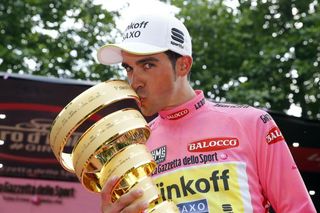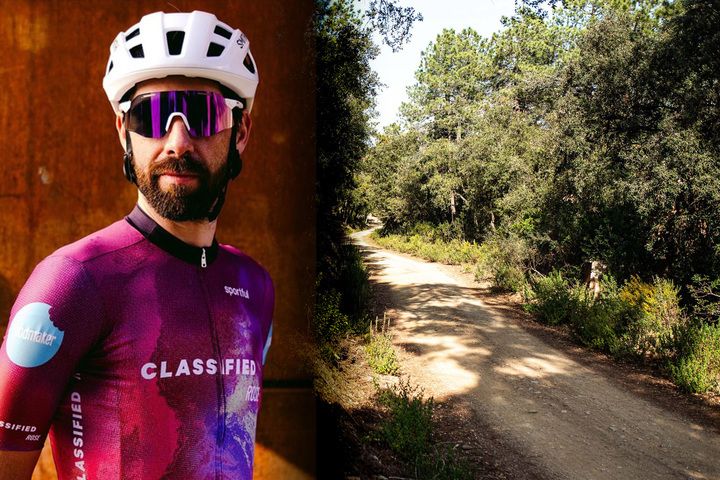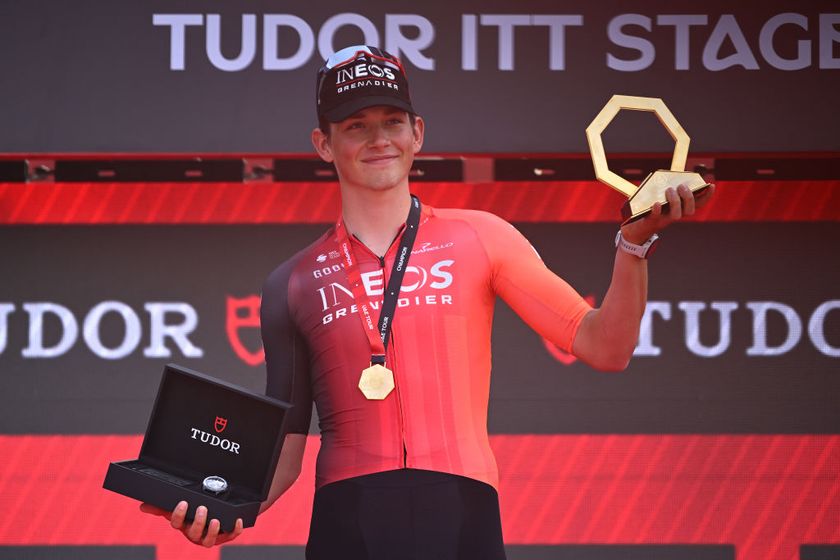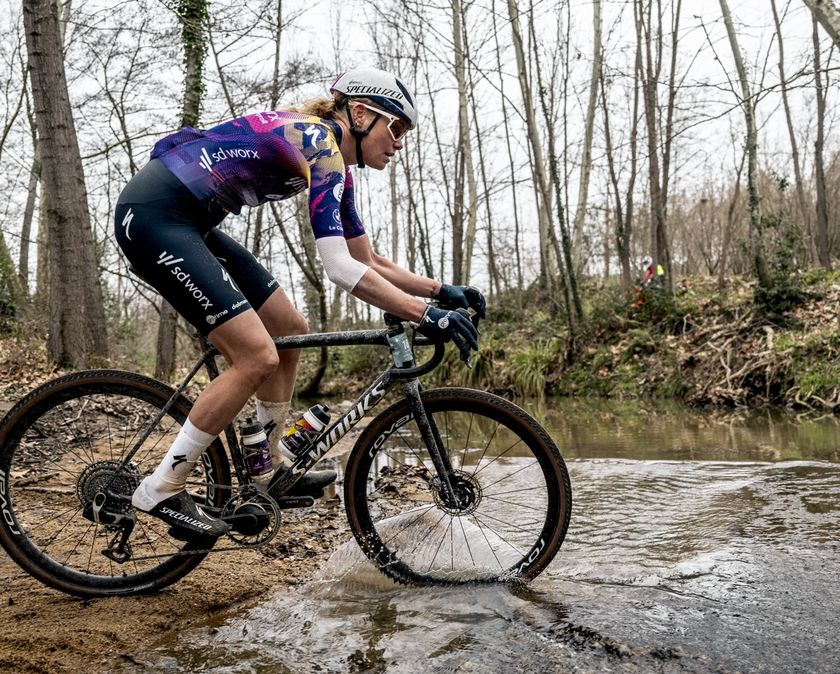Contador's legacy in the spotlight after Giro d'Italia win
Spaniard the leading GC rider of his generation






As the pink confetti rained down on 2015 Giro d'Italia winner Alberto Contador in Milan on Sunday evening, the questions over his Giro-Tour 'double' were already beginning to accumulate.
But in the very unlikely event that Contador was to step away from racing on Monday and spend July on a beach rather than on his bike, where would winning the Giro d'Italia this May now place the 32-year-old in the history books?
After all his retirement will likely be in less than 18 months, and Contador rarely talks about 'legacy', saying that he is tackling the Giro d'Italia and the Tour de France as something for his fans and for pure sporting interest.
"Obviously one thing never changes for me: whenever I go to a race, I like fighting to win it," he told sister publication ProCycling earlier this season. "But I don't think about my legacy, that's not what spurs me on. Rather, I'm doing this double firstly because I like it when people enjoy the racing I do. I want to do everything in my power to make a race interesting.
"Partly I feel, too, that no matter how difficult the Tour de France is, another Tour de France, won by itself, wouldn't add much to my palmares. But winning the Giro and Tour in the same year would put things on another level."

Although a victory in the Tour de France would once again change Contador's place in cycling’s record books, it has yet to be lost or won. But before July arrives, it is worth looking at where Contador stands now, after winning one of the most hard-fought Giros in recent history.
Inside Spain, Contador's legacy post Giro leaves him second only to Miguel Indurain as the country's top bike racer. Contador has now equalled Indurain in terms of Grand Tour wins - seven each - and Giro d'Italia victories - two apiece - but all but the most partisan of Contadoristas would recognise that Indurain's five Tours de France (1991-1995) still act as a nearly unbreachable bulwark for Big Mig to retain his status as Spain's greatest-ever cyclist, and for that matter, athlete.
Get The Leadout Newsletter
The latest race content, interviews, features, reviews and expert buying guides, direct to your inbox!
Further afield, at home and abroad, thanks to the Giro Contador's status as the outstanding Grand Tour stage racer of his generation has been underlined yet again. With the exception of Ivan Basso, a double Giro d'Italia winner, there is no other Grand Tour champion currently in the peloton who has taken any three-week stage race more than once. Contador, as of Sunday afternoon, now has multiple victories in all three.
At this point, many Contadoristas would say - as the man himself does - that in fact the 32-year-old has three Giro d'Italia wins and three Tours in his palmares. Those hat-tricks of wins exist if you count the two Grand Tour titles (the Tour 2010 and Giro 2011) removed in the history from Contador's palmares following the retro-active application of a suspension for a clenbuterol positive. But either way, regardless of the richness of Contador's palmares, its undeniable that the time-span that Contador has now spent heading cycling's Grand Tour hierarchy is - again, post the Giro d'Italia 2015 - now in a historical class of its own.
A matter of consistency
One of the most impressive elements of the Spaniard’s race record, as Greg LeMond has pointed out, is Contador's consistency. The Tinkoff-Saxo rider had already spent two years longer at the top in terms of the time span of his Grand Tour wins (2007-2015) than both Eddy Merckx (1968 - 1974) and Bernard Hinault (1978 - 1985). But now, following his Giro d'Italia victory, Contador has finally outmatched the longest of any of the 'Big Four's' runs of success in Grand Tours, Jacques Anquetil's eight year stretch from 1957 (in the Tour de France) to 1964 (his fifth and last Tour), too.
For further evidence of Contador's consistency, and again depending on how you look at those 'virtual' Giro and Tour victories in 2010 and 2011, it's worth remembering that since 2007, only in one year - 2013 - has Contador failed to take a Grand Tour win of some description.
Contador has racked up the GT victories even when simply a return to racing must have felt like a victory for the Spaniard. The two best examples of that are his wins in the 2012 Vuelta a España, following the end of his suspension just a few days before the race, and in the same race in 2014 after he fractured his tibia in the Tour de France.
In 2012, from the second rest day onwards, Contador simply refused to accept the mounting evidence that Joaquim Rodriguez had such a big advantage time-wise he could not beat him - and again in 2014, when it seemed almost impossible he could top a Grand Tour podium again so quickly, Contador took a second, highly memorable, victory. Consistency, once again, paid off.

No bad days
Not only that, it's surely no coincidence that a failure to have a complete 'off-day' - although Saturday on the Colle dell Finestre was close - has also been Contador's trump card throughout the 2015 Giro d'Italia.
Barring one day, when he was caught up in a crash, the Spaniard has held the pink jersey ever since stage five. For those armchair fans who have criticised the absence of Tinkoff-Saxo domestiques alongside Contador in the mountains, it's worth remembering that showing such a strong hand from such an early point in the race may well have caused his team to melt away on the climbs.
But Contador's Tinkoff-Saxo teammates have held the race together for day after day on the flat and hilly stages. Furthemore, teammates Matteo Tossato's handing over a bike at Jesolo, and Ivan Basso's back wheel before the Mortirolo, were memorable episodes of team solidarity when it was most crucial, too. "Without my team-mates, I wouldn't have this leader’s jersey," Contador said, 24 hours before winning in Milan.
"I'd prefer to have a good leader and a weak team than the other way round," Dave Brailsford, Team Sky Principal, said during the 2013 Tour when Chris Froome was seemingly vulnerable because his teammates were not firing on all cylinders.
Given that Contador's ability to hold his own, his blisteringly strong performances in every terrain from time trials to the Mortirolo, has been at the heart of this year's Giro success, and that final overall victory - just like Froome in 2013 - it's hard to disagree. In fact, the Spaniard's ability to lead and dominate a Grand Tour even when on the back foot, that tenacious consistency from day to day as well as from year to year, will surely be seen as part of Contador's lasting legacy, too, when he retires. And not the least part of it, either.
Alasdair Fotheringham has been reporting on cycling since 1991. He has covered every Tour de France since 1992 bar one, as well as numerous other bike races of all shapes and sizes, ranging from the Olympic Games in 2008 to the now sadly defunct Subida a Urkiola hill climb in Spain. As well as working for Cyclingnews, he has also written for The Independent, The Guardian, ProCycling, The Express and Reuters.
Most Popular





